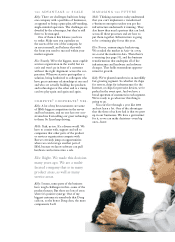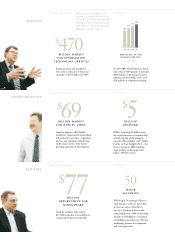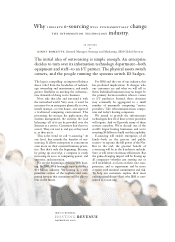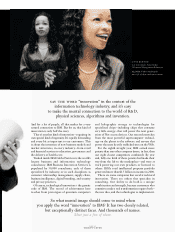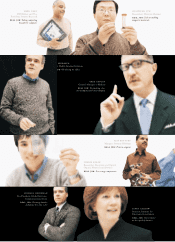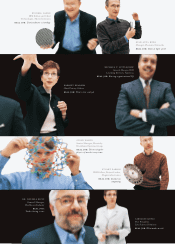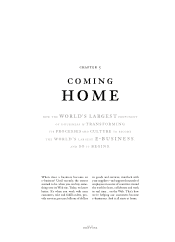IBM 2000 Annual Report Download - page 35
Download and view the complete annual report
Please find page 35 of the 2000 IBM annual report below. You can navigate through the pages in the report by either clicking on the pages listed below, or by using the keyword search tool below to find specific information within the annual report.
The logic is compelling: an improved balance
sheet; relief from the headaches of technol-
ogy ownership and maintenance; and much
greater flexibility in meeting the infrastruc-
ture demands of doing real e-business.
Now, take that idea and surround it with
the networked world. Very soon, it won’t be
necessary for an enterprise physically to own,
install, manage
—
or even house
—
any aspect of
a traditional computing environment. The
processing, the storage, the applications, the
systems management, the security, the load
balancing
—
all of it can be provided over the
Internet as a service. Customers don’t have to
own it. They can rent it, and pay as they need
it, as they use it.
This is the trend we call “e-sourcing.” At
one level, this extends the benefits of out-
sourcing. It allows enterprises to concentrate
even more on their essential business priori-
ties. But that’s only the beginning. Because,
by giving up ownership, a company is vastly
increasing its access to computing power, and
expertise, and innovation.
We see the beginnings of this in Web host-
ing. By 2003, Web hosting is expected to be a
$34 billion industry. Yet hosting is a very
primitive version of the sophisticated com-
puting services that customers will be able to
rent in the future.
For IBM and the rest of our industry, this
has profound implications. It changes who
our customers are and what we will sell to
them. Individual businesses may no longer be
the primary decision makers when it comes
to I
/
Tpurchases. Instead, those decisions
may eventually be aggregated to a small
number of mammoth computing “service
providers,” like telecommunications compa-
nies and today’s hosting companies.
We intend to provide the infrastructure
technologies that all of these service providers
will require. And we’ll provide many of these
services ourselves. We’re already one of the
world’s largest hosting businesses, and we’re
investing $4 billion to build out this capability.
E-sourcing will enable enterprises of all
kinds
—
both in the private and public
sectors
—
to tap into the full power of the Net.
But in the end, the greatest benefit of
e-sourcing will be in the freedom it unlocks.
Sure, it will create enormous efficiencies. But
the game-changing impact will be freeing up
all companies
—
whether just starting out or
well established
—
to focus on their core com-
petencies, and to experiment and be more
creative, with minimal commitment and risk.
To help our customers explore their most
exciting possibilities
—t
hat’s why IBM is com-
mitted to e-sourcing.
hosting revenue
ibm’s e-business
doubled in 2000.
an opinion
by
ginni rometty,General Manager, Strategy and Marketing, IBM Global Services
The initial idea of outsourcing is simple enough. An enterprise
decides to turn over its information technology department
—
both
equipment and staff
—
to an I
/
Tpartner. The physical assets switch
owners, and the people running the systems switch ID badges.
Why i believe e-sourcing will fundamentally change
the information technology industry.




